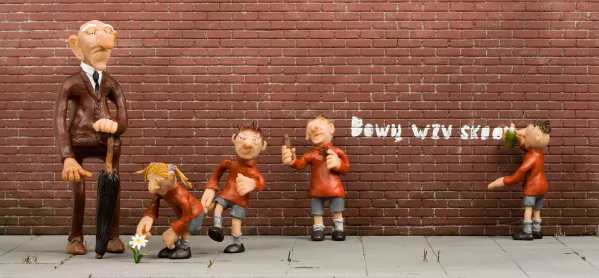In an educational climate where GCSE results are the currency, where teachers feel increasingly pressured into teaching to the test, we can sometimes forget that education also has a role in shaping students into good citizens.
The London Fire Brigade recently launched a campaign reminding people to call 999 before filming an incident, in light of increasing numbers of bystanders posting on social media rather than summoning assistance.
In schools, there’s a similar issue with students filming unpleasant events.
Quick read: The death of the staffroom is a sign of bigger problems
Quick listen: Could Bananarama be the answer to social mobility?
Want to know more? How horticulture transforms student mental health
The word “fight” sends pupils racing to the scene, phone in hand, to record proceedings. This footage is then shared via various social media platforms, where it could be seen by millions of users.
At a school I worked in a few years ago, a Year 11 pupil filmed a Year 7 student on the toilet and shared the footage on social media. It was seen and shared hundreds of times before it was taken down.
But why are people, including our pupils, choosing to film events rather than going to find help?
It feels like it’s linked to our image-obsessed culture, where being able to show that you were at the scene of the action can seem more important than helping to sort it out.
It’s a moral question. The moral education of children should primarily fall to parents, of course, but schools do have a part to play in ensuring that their pupils are equipped with the skills to be good citizens in an increasingly conflicted world.
Life lessons
Subjects such as English, RE and history offer excellent opportunities for students to think deeply and philosophically about events in the world, while learning to critically evaluate their own actions and opinions in relation to them.
I was looking at A Christmas Carol with a Year 11 class last week, exploring Scrooge’s opinion of the poor. I put up a controversial statement about it being the Cratchit family’s own fault that they were in dire straits.
This elicited a variety of responses, including that Bob should have got a better-paid job or not had as many children.
After I linked their thinking to modern Britain and explained that, today, many people who use food banks work full-time and still cannot afford to eat, a number of students revised their opinions and could see a different perspective.
Relationships are also of the utmost importance when providing a character education. As adults, we model the measured ideologies we want our pupils to go forth with. We are not trying to produce carbon-copy little liberals, but enabling pupils to see issues as not always black-and-white is important.
This is why the role of form tutor is so fundamental. The job can often be taken up by the reading of notices and monitoring of standards but form time is a golden opportunity to chat to pupils and find out what really makes them tick, including tackling and discussing problematic statements they may make.
Exam results are important but failing to teach pupils to be empathetic could have devastating consequences.
Haili Hughes is an English teacher at Saddleworth School in Oldham, Greater Manchester. She tweets @HughesHaili




